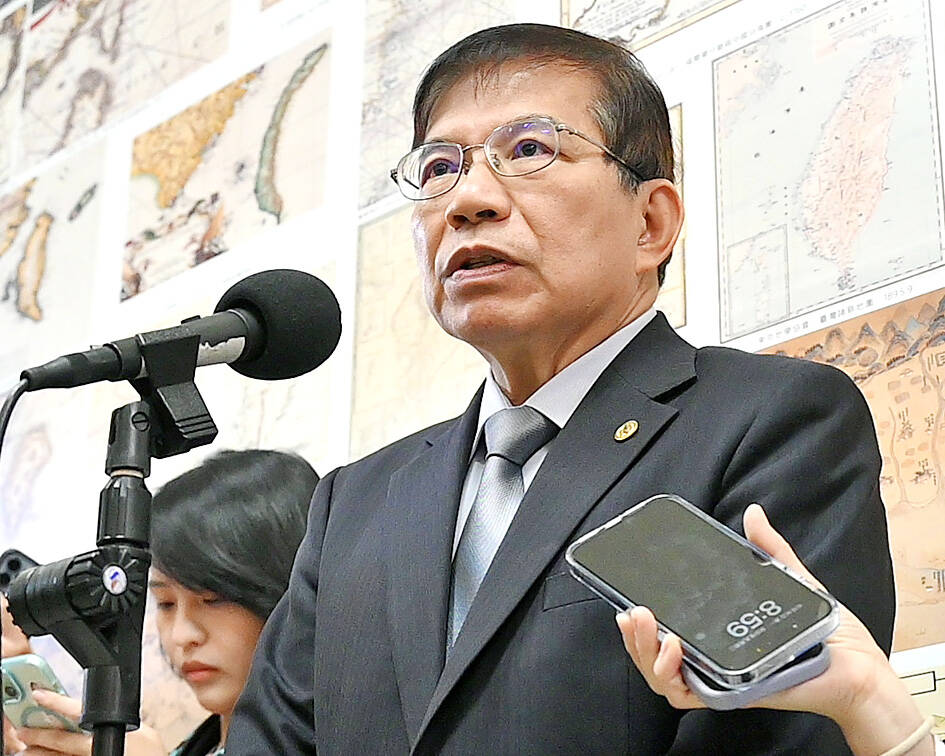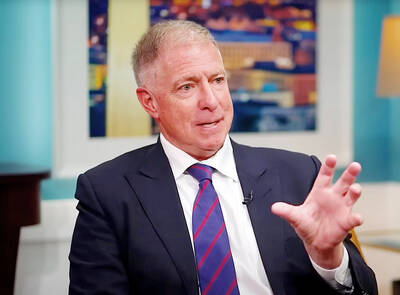Chinese tour groups are not likely to come to Taiwan until next year, Minister of Transportation and Communications Wang Kwo-tsai (王國材) told the legislature’s Transportation Committee yesterday.
“We have learned through our unofficial channel of communications that [Chinese tourists] are unlikely to come this year. We will see about next year,” Wang told Chinese Nationalist Party (KMT) Legislator Fu Kun-chi (傅崐萁).
The government has since last month allowed Chinese living or studying outside China, or in Hong Kong or Macau, to visit Taiwan for tourism.

Photo: Tu Chien-jung, Taipei Times
The Mainland Affairs Council on Aug. 24 said that it aimed to fully resume cross-strait tourism following a 30-day preparation period, and would cap the number of Chinese group travelers to Taiwan at 2,000 per day in the initial phase, adding that the same daily quota would also apply to Taiwanese tour groups traveling to China.
When cross-strait tourism could resume would depend largely on China’s response to the new policy, the council said.
However, the council said at the end of last month that it has yet to receive any official response from Beijing.
“We must be crystal clear about where we stand on cross-strait tourism issues. We have shown goodwill and would allow Taiwanese tour groups to visit China, but if Beijing only allows Taiwanese to visit China while continuing to impose a travel ban to Taiwan for Chinese group travelers, it would eventually hurt our hoteliers and restaurateurs,” Wang said.
Separately, Democratic Progressive Party Legislator Lee Kun-tse (李昆澤) blamed the Tourism Administration for a lack of growth in international visitor numbers.
The World Tourism Organization has projected that this year’s international tourism market is expected to return to at least 80 percent of pre-COVID-19 levels, up from 63 percent last year, Lee said.
The report also states that the recovery of international tourism in some countries could reach 90 percent of pre-pandemic levels this year, Lee said.
From January to August, Taiwan welcomed 3.82 million international travelers, which accounted for only 48 percent of international arrivals during the same period in 2019, Lee said.
By contrast, 7.34 million Taiwanese had traveled overseas as of August, which was 62.8 percent of the number recorded during the same period in 2019.
In Japan, the total number of inbound tourists had as of August recovered to 70 percent of the 2019 level, Lee said, citing data from the Japan National Tourism Organization.
The number of international arrivals in Japan in August returned to 86 percent of the level recorded in the same month in 2019.
Even if the Tourism Administration could manage to reach its goal of 6 million international tourists visiting Taiwan this year, it would only be 49 percent of the level recorded before COVID-19, Lee said.
Domestic tourism also showed no signs of recovery, Lee said.
The average hotel occupancy rate during the Mid-Autumn Festival long weekend was 49.28 percent, while that for the Double Ten National Day long weekend was 59.93 percent, he said.
Lee said there were several hurdles for Taiwan in attracting international tourists, including difficulties in transiting between different public transport systems, confusing road signs, a lack of characteristics in some tourist attractions and tours with low cost-performance ratios.
In response, Tourism Administration Director-General Chou Yung-hui (周永暉) said that Japan would not have mostly returned to its pre-COVID-19 levels if it discounted Chinese tourists, adding that the devaluation of the Japanese yen also prevented many Japanese from traveling overseas.
“We would increase our offices overseas, which would be in charge of conducting tourism campaigns to attract international travelers,” Chou said.

The Grand Hotel Taipei on Saturday confirmed that its information system had been illegally accessed and expressed its deepest apologies for the concern it has caused its customers, adding that the issue is being investigated by the Ministry of Justice Investigation Bureau. The hotel said that on Tuesday last week, it had discovered an external illegal intrusion into its information system. An initial digital forensic investigation confirmed that parts of the system had been accessed, it said, adding that the possibility that some customer data were stolen and leaked could not be ruled out. The actual scope and content of the affected data

DO THEY BITE IT? Cats have better memories than people might think, but their motivation is based entirely around the chance of getting fed Cats can remember the identity of the people who fed them the day before, Taipei-based veterinarians said on Friday, debunking a popular myth that cats have a short memory. If a stray does not recognize the person who fed them the previous day, it is likely because they are not carrying food and the cat has no reason to recognize them, said Wu Chou Animal Hospital head Chen Chen-huan (陳震寰). “When cats come to a human bearing food, it is coming for the food, not the person,” he said. “The food is the key.” Since the cat’s attention is on the food, it

A New York-based NGO has launched a global initiative to rename the nation’s overseas missions, most of which operate under the name "Taipei," to "Taiwan Representative Office (TRO)," according to a news release. Ming Chiang (江明信), CEO of Hello Taiwan, announced the campaign at a news conference in Berlin on Monday, coinciding with the World Forum held from Monday through Wednesday, the institution stated in the release. Speaking at the event, Democratic Progressive Party Legislator Huang Jie (黃捷) said she believed this renaming campaign would enable the international community to see Taiwan

DEFENSE: The US should cancel the US visas or green cards of relatives of KMT and TPP lawmakers who have been blocking the budget, Grant Newsham said A retired US Marine Corps officer has suggested canceling the US green cards and visas of relatives of opposition Taiwanese lawmakers who have been stalling the review of a proposed NT$1.25 trillion (US$39.7 billion) special defense budget. The Executive Yuan has proposed the budget for major weapons purchases over eight years, from this year to 2033. However, opposition lawmakers have refused to review the proposal, demanding that President William Lai (賴清德) first appear before the Legislative Yuan to answer questions about the proposed budget. On Thursday last week, 37 bipartisan US lawmakers sent a letter to Legislative Speaker Han Kuo-yu (韓國瑜), the heads